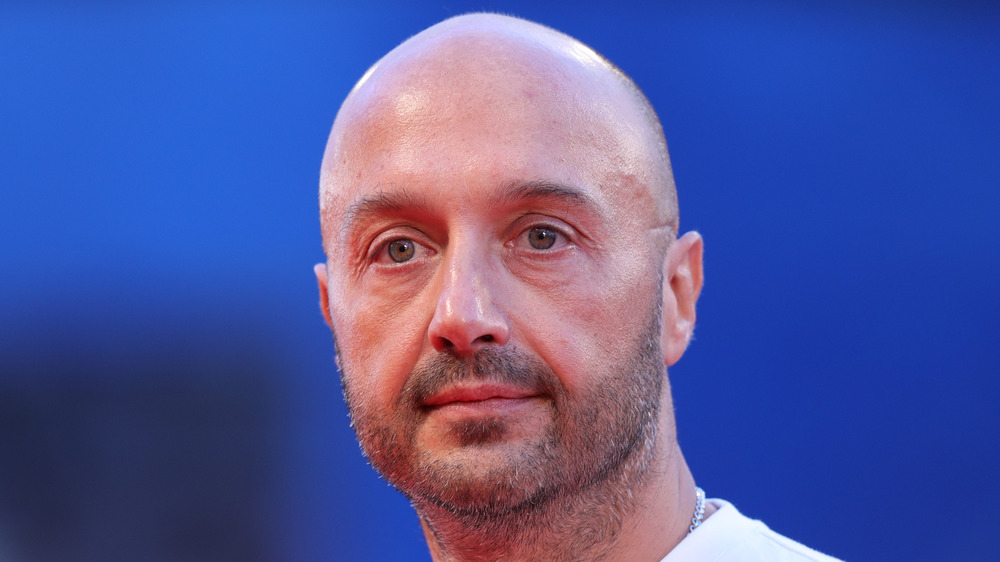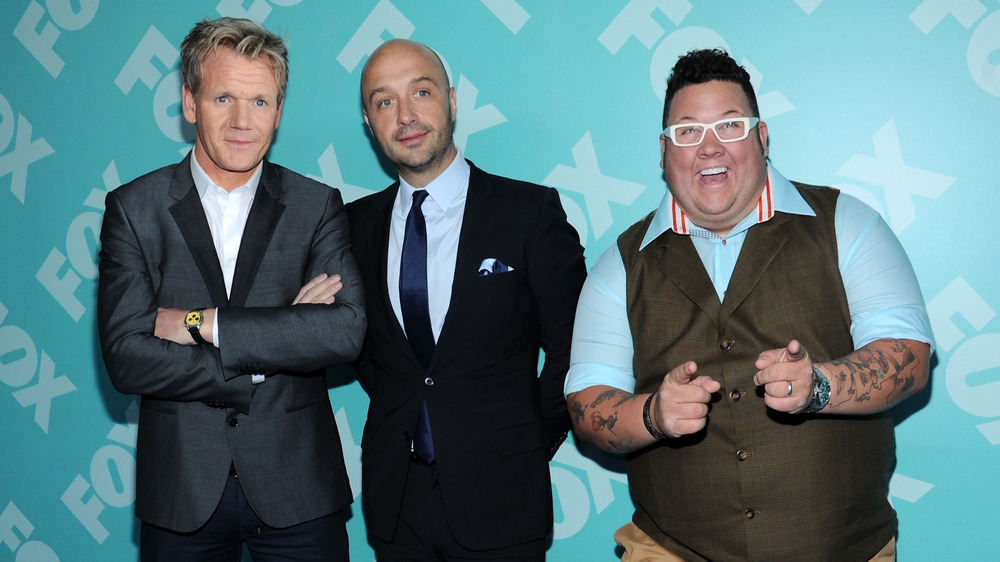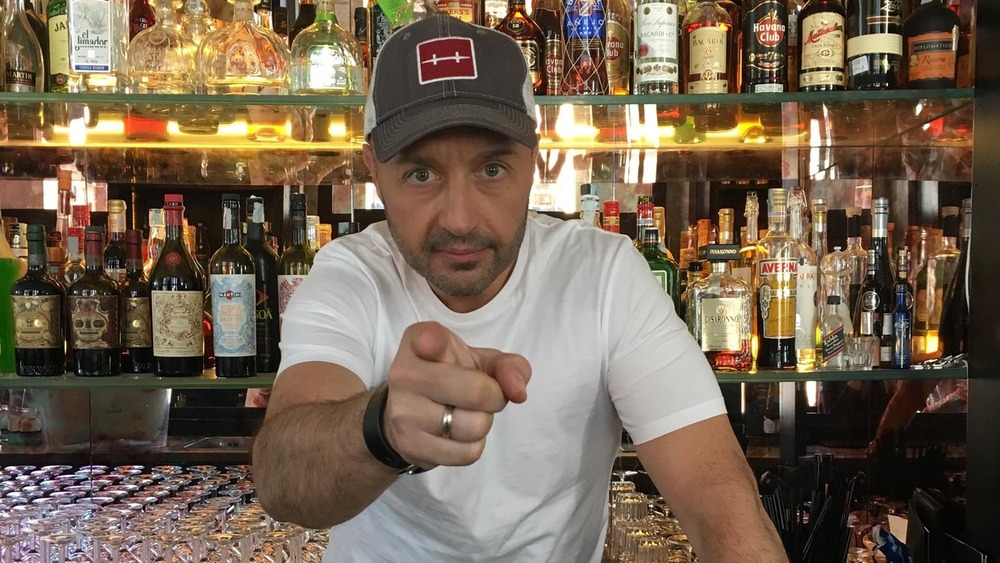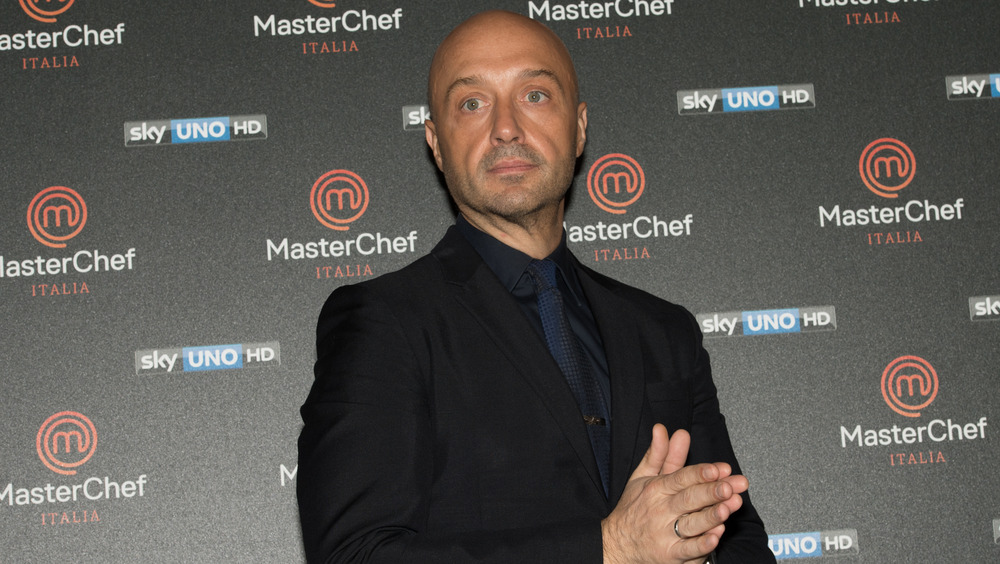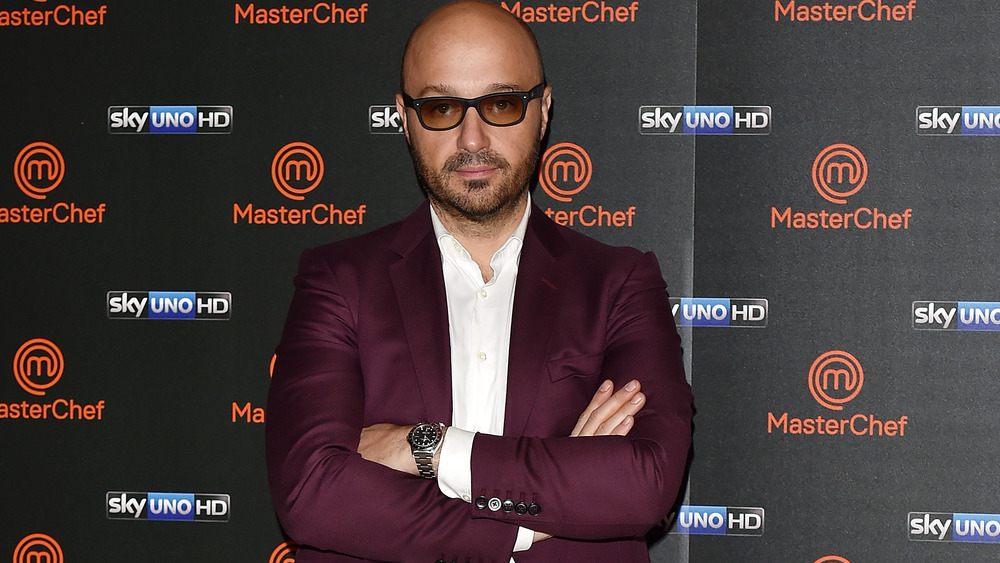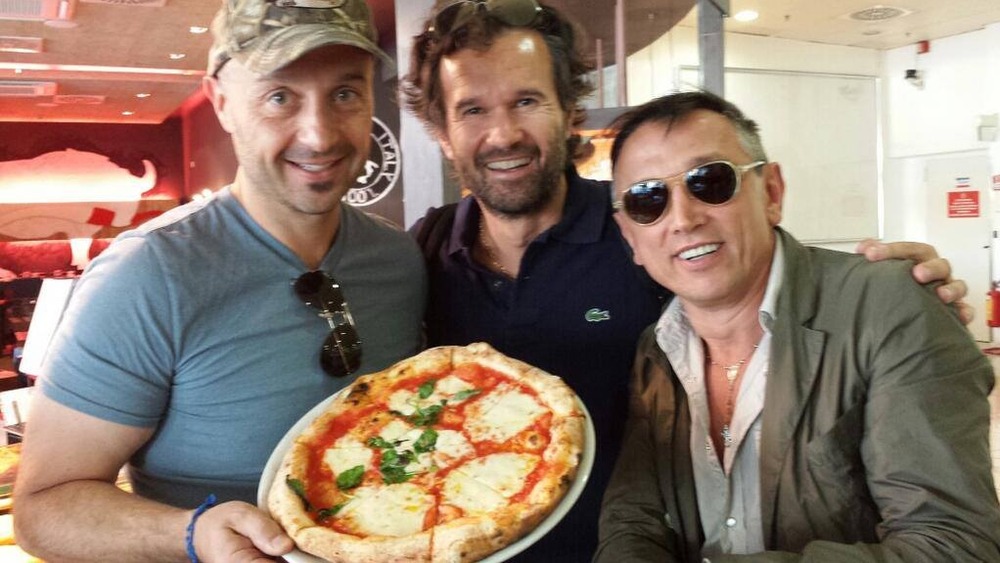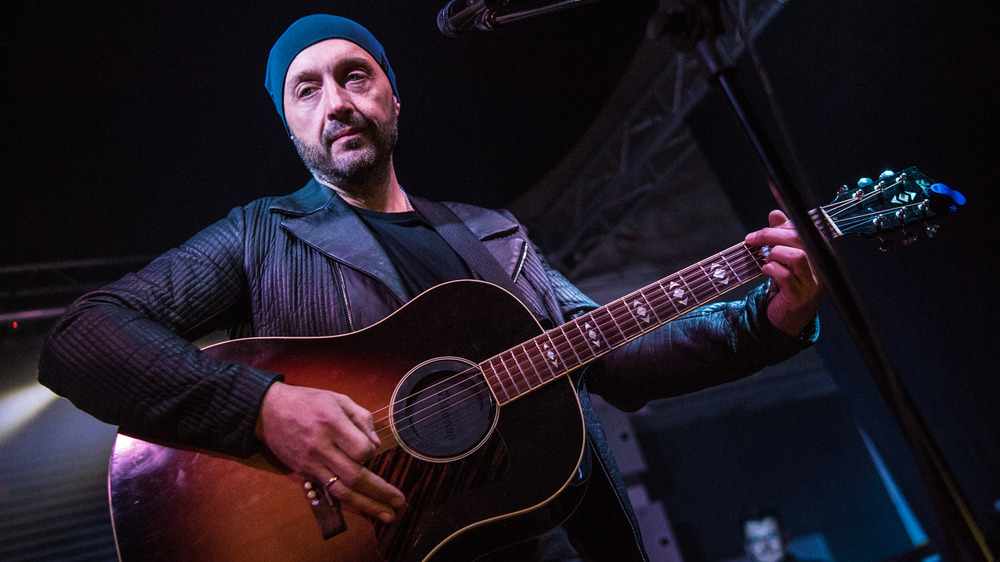MasterChef Judge Joe Bastianich Talks Italian Food, Restaurant Management, And More - Exclusive Interview
For Joseph Bastianich, working in the food industry has always been a life's work. Sure, he worked on Wall Street for a bit after graduating from college, but one long trip to Italy after a year trading bonds on "The Street" cemented things for Bastianich, and he plunged into the restaurant business with a passion. Or rather plunged back into restaurants, having grown up helping his parents with their a successful New York City Italian restaurant during much of his youth.
Today, Bastianich helps his family and their larger team manage restaurants and gourmet food shops around America and in multiple countries around the globe, but these days, restaurants and food sellers aren't the only thing keeping Bastianich busy.
Perhaps best known for his work as a MasterChef judge, a role he has played for many seasons of the show alongside luminaries of the culinary world like Gordon Ramsay, Bastianich is also a musician, author of several books, a vineyard owner and winemaker, and a frequent guest on TV shows beyond MasterChef. He also does frequent work helping foster better global understanding of the authentic cuisine of his family's native Italy, such as his work promoting Grana Padano cheese, a cheese protected under Protected Designation of Origin rules, much like wine from the French region of Champagne or Kalamata Greek olive oil.
When Mashed caught up with Joe Bastianich, he made time to talk about all of this and more, including what the life of a busy restaurateur and TV personality has been like during the ongoing COVID-19 pandemic, and what career he might have liked to embark on had he not stuck with the food business that was always in his blood.
Joe Bastianich dishes on MasterChef, both on and off camera
How well do the MasterChef judges tend to get along off-screen?
Oh, it's like a family. Gordon [Ramsay] and I have been doing it for 12 years. There are a lot of the same people in production. It's an intense two or three months we spend together, so it's very much a family. That kind of energy that you see on the screen exists also off the screen. So we're like friends making a TV show every year.
What are the most common mistakes that you see amateur chefs making on MasterChef?
There's a couple. Seasoning. Seasoning throughout the cooking process is probably number one. Using too much firepower, number two. The third mistake is having culinary ideas that outpace your ability in the kitchen. Those are the three top mistakes.
Do you remember the best and worst thing or things that you ever ate on the show?
Well, back in the early days, 12 years ago, I could remember some things that were pretty horrendous specifically. I don't know. There was one, I think season two, it was called Hillbilly Sushi. It might go down as one of the worst.
(Mashed did some digging and figured out it was actually called "Redneck Sushi," and Bastianich's co-host Gordon Ramsay also excoriated the dish.)
Some of the best things, I have to say maybe two contestants come to mind. Christina Ha, who was a young lady who was blind who did the Southeast Asian cuisine, which was really incredible. Some of her dishes. Also there was an Italian guy named Luca who made some Italian dishes — that might've been season five or six — that were very near and dear to my heart.
Can you tell what an amateur chef on the show is likely to develop into a great chef? And if so, what are some of the signs?
The chefs that have the most potential are the ones that take the feedback from the judges. We're there as mentors as well as to judge them and if they can evolve quickly taking our feedback, you see an evolution in their food, and then the sky's the limit after the show. Even within the context of the show and the 22 episodes we spend together, if they can show evolution, if they take feedback, and then they have to have some natural talent. But evolution is the key to a chef's potential.
Joe Bastianich talks about managing restaurants and food shops all over the globe
How do you keep abreast of things when you're managing or co-managing restaurants all around America and in international locations?
I think that the team is everything. You have to be able to share your culinary vision, hospitality vision with your team leaders, empower them, give them the support, and clear vision. It's really just about the team because obviously there's very little you can do by yourself.
How has the pandemic made managing multiple restaurants even harder?
Well, when they were all closed it was really easy. We just stayed home. I think that in the reopening phase, the team members realized that coming back in a post-COVID world is a superior challenge. We have all the challenges of hospitality and creating great food, coupled with that of maintaining safety guidelines, which puts additional challenges on the management team. But with the kind of guys we have, they rise to the level of safety first. Extending, creating new opportunities for hospitality, it's kind of a bit of a reinvention of what we've always done within the parameters of safety in a COVID world and also managing an evolved expectations of customers because the customer is definitely evolving post-COVID.
So it sounds like, for you, surrounding yourself with the right people is absolutely critical.
That is key.
How closely involved are you with Eataly and what does the chain's continued expansion mean for your family and for the expanding perception of Italian food, both in America and globally?
As the founding partner of Eataly in North and South America, our expansion is really robust. I think that post-COVID, Eataly's positioned to really continue its mission of bringing the best of Italy to consumers everywhere in the country. I think that there's a demand [for] quality of life. Quality of life is quality of diet. I think Eataly brings all the best ingredients.... We have the best of the best of Italian artisanal food production and that's what people want. Eataly not only has the product, but we take the time to educate people with recipes, with information. So it's a full immersion experience of top-grade product combined with education and communication.
How were Eataly locations received by the locals [in Italy]?
It's a different market in Italy because people are more used to having access to these products, even without Eataly. But Eataly takes the best of the best and packages it together. Even for the Italians, it's very much appreciated for the quality of all selections you will find in the store.
Joe Bastianich on the differences (and similarities) between professional and home cooks and kitchens
What are the things that go on in a professional kitchen that might surprise a casual home cook, be it that they're so different from what we're doing at home or that they're actually the same?
I think the difference in a professional kitchen is the mise en place. The preparation of doing repetition, making the same dish 10, 20, 30 times a night is something we don't do at home. The amount of preparation that goes into the mise en place is something that home cooks don't often understand about professional kitchens.
And what are some things that professional chefs are doing that may be something just like you're doing [at home]?
I think the things that are the same is the importance of the quality of the ingredients. Whether at home or in the kitchen, the ingredients are the fundamental aspect making sure that your dish is great.
Are there things that you wish home cooks knew that you always try to impart on MasterChef contestants? Things that all the pros know that you wish every home cook knew and took to heart?
Just the kind of commitment, struggle, and passionate takes to rise up the ranks in a professional kitchen. People take it for granted. They think that because they throw a great dinner party and people say they're great that they're great cooks. But that the road to truly becoming a professional cook or even chef, is a long and hard one that requires a lot of investment, suffering, and a commitment to get to the end.
These are the foods Joe Bastianich is most passionate about
You have done a lot of work promoting Grana Padano cheese – what makes it the world's bestselling PDO [Protected Designation of Origin] cheese?
Well, it's this staple of everyday Italian cuisine. If you go to Italy, Grana Padano is in the kitchen of every household. It's used as an eating cheese for its taste and nutritional content, as a grating cheese, as a cooking cheese. It's the everyday cheese that Italians really use that sets Italian food apart. So if you could integrate that, having a piece of Grana Padano in your fridge at home will elevate everything you do. Whether you're going to do an asparagus dish, if you're going to add it to a crusting on a chicken breast, if you're going to obviously make pasta risotto, or just eat it for its nutritional value. It's really one of the... it's like olive oil, San Marzano tomatoes, and balsamic vinegar, it's the basic building block of Italian cuisine.
Which other cheeses do you think a chef should always have on hand in their kitchen?
Well, Grana Padano as a dry cheese is definitely the standard, but then you should probably have something like a fresh mozzarella or a burrata. Then maybe something a little bit more flavorful and soft and creamy, like a gorgonzola.
What are your favorite things to cook when you're just cooking at home for family or friends?
Well, I'm not a chef by trade, but I do cook. I love to grill. I love grilling meats in various forms. I love open fire cooking. At home when there's no grill or it's winter time, I love to make seafood based pastas.
What's a fast food menu item that you actually enjoy?
I am an often eater of the McDonald's Double Cheeseburger.
What Joe Bastianich wishes more people understood about Italian food
What are some of the myths that people in the United States get wrong about Italian food?
I think there is an Italian-American food that exists in this country that is an evolution of Italian food. People think that that's what people eat in Italy and that's wrong. I think the amount of garlic people perceive that's in Italian food. I think garlic is very gingerly or lightly used in Italy as a seasoning, not as a major flavor component. I think those are the two big misconceptions.
What are some of the biggest mistakes people make when cooking Italian food?
Basic techniques with pasta. Whether it be not enough salt in the water, rinsing the pasta with water afterwards, not cooking the pasta with the sauce. I think that is a very, very common mistake that we try to correct.
Joseph Bastianich talks life beyond MasterChef, restaurants, and global grocery shops
What was the motivation to add wine making to your resume and your activities?
Oh, it was a lifelong passion. It was a dream I had as a very young person. Twenty-five years ago I had to means to invest in vineyards and it was just kind of a dream come true.
Beyond restaurants, which of your pursuits do you think most defines you, be it music, wine making, TV work, or do they all just sort of blend?
I think that I have my passions, which are my music and even my creative aspect of what I do in television. Then there's the work part. I've always worked in restaurants, my family has always worked in restaurants. So making food and grocery stores is part of the work. There's a lot of passion in that too, but it's different when your passion is combined with work. As opposed to a pure passion like writing or making music, it's different.
How do you balance the time spent working on shows, internationally and in the US, the restaurant business, and all the various things that you do in your career?
Again, I have the fortune of having a dichotomy in my life between media and restaurant operations and that's exactly how I treat it. I dedicate myself, I have a team — we handle the media part of what I do in Italy and here in America. Then my sister runs the restaurant company with me. So it's really, for me, about having the time to allow you to express your emotions and your vision in whatever project you do, and having the people around you who can help you extrapolate that into something that has an effect on people. Whether it be through the TV screen or in the restaurants they're dining at.
If you had never gotten into food and restaurants, what do you think you might've done as a career?
I always dreamt of being an architect, but that's not going to happen.
Well, you can always go back to school.
No, too late for me!
You can learn more about Grana Padano on their website. Follow along on Instagram for new recipes and updates about their work with Joe Bastianich.
